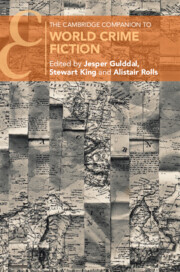Book contents
- The Cambridge Companion to World Crime Fiction
- The Cambridge Companion to World Crime Fiction
- Copyright page
- Contents
- Notes on Contributors
- Preface
- Chronology
- Chapter 1 What Is World Crime Fiction?
- Chapter 2 Crime Fiction and the International Publishing Industry
- Chapter 3 The Translation and Circulation of Crime Fiction
- Chapter 4 The International Crime Fiction Collection
- Chapter 5 Regional Crime Fiction
- Chapter 6 Women in World Crime Fiction
- Chapter 7 East Asian Crime Fiction
- Chapter 8 Crime Fiction in South Asia
- Chapter 9 Arab Crime Fiction
- Chapter 10 The Crime Fiction of Sub-Saharan Africa
- Chapter 11 European Crime Fiction
- Chapter 12 Scandinavian Crime Fiction
- Chapter 13 Iberian and Latin American Crime Fiction
- Chapter 14 World Crime Fiction in French
- Further Reading
- Index
- Cambridge Companions To …
Chapter 3 - The Translation and Circulation of Crime Fiction
Published online by Cambridge University Press: 14 April 2022
- The Cambridge Companion to World Crime Fiction
- The Cambridge Companion to World Crime Fiction
- Copyright page
- Contents
- Notes on Contributors
- Preface
- Chronology
- Chapter 1 What Is World Crime Fiction?
- Chapter 2 Crime Fiction and the International Publishing Industry
- Chapter 3 The Translation and Circulation of Crime Fiction
- Chapter 4 The International Crime Fiction Collection
- Chapter 5 Regional Crime Fiction
- Chapter 6 Women in World Crime Fiction
- Chapter 7 East Asian Crime Fiction
- Chapter 8 Crime Fiction in South Asia
- Chapter 9 Arab Crime Fiction
- Chapter 10 The Crime Fiction of Sub-Saharan Africa
- Chapter 11 European Crime Fiction
- Chapter 12 Scandinavian Crime Fiction
- Chapter 13 Iberian and Latin American Crime Fiction
- Chapter 14 World Crime Fiction in French
- Further Reading
- Index
- Cambridge Companions To …
Summary
This chapter sketches out some ways translation aids the circulation of crime fiction across cultures and literary systems, with examples from the early twentieth century and from more recent times. The importance of setting and ‘local colour’ is examined as a key factor in the popularity of certain writers and traditions across international borders, as are editorial and publishing decisions relating to such paratextual elements as titles, cover images and blurbs. One historical example comes from Mondadori’s series of gialli, which was enormously successful in Italy from the 1930s on and which included many translated texts. These works went on to influence local writers, resulting in the importation and adaptation of certain subgenres and tropes. A case study of translations into English of the enormously successful Montalbano novels of Sicilian writer Andrea Camilleri provides the opportunity to investigate the kinds of choices translators and publishers make in preparing a text for a new audience and market. The analysis looks at the translation of dialect and non-standard language, culture-specific political and historical content and the value of translators’ notes.
Keywords
- Type
- Chapter
- Information
- The Cambridge Companion to World Crime Fiction , pp. 46 - 64Publisher: Cambridge University PressPrint publication year: 2022

